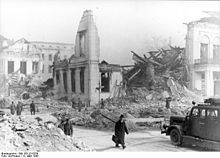- Ministry of Public Enlightenment and Propaganda
-
The Reich Ministry of Public Enlightenment and Propaganda (German: Reichsministerium für Volksaufklärung und Propaganda or Propagandaministerium) was Nazi Germany's ministry that enforced Nazi Party ideology in Germany and regulated its culture and society. Founded on March 13, 1933, by Adolf Hitler's new National Socialist government, the Ministry was headed by Dr. Joseph Goebbels and was responsible for controlling the press and culture of Nazi Germany.
The Ministry was based in the Ordenspalais in Berlin-Mitte on the Wilhelmplatz across from the Reich Chancellery.
Contents
Role in the Nazi state
When the Nazis took power the Propaganda Ministry was established almost immediately. It was charged with enforcing Nazi doctrine on the people and controlling public opinion. However, the Ministry became even more important after the outbreak of war.
World War II was conducted with a much greater level of propaganda than World War I, especially in the new media of film and radio. Because of practical experience and scientific occupation with propaganda in Europe and USA, propaganda was organised in a planned fashion. A new psychological warfare was born.
Organization
The Ministry grew steadily. It began in 1933 with five departments and 350 employees. By 1939, there were 2000 employees in 17 departments. Between 1933 and 1941, the Ministry's budget grew from 14 million to 187 million Reichsmarks. Three state secretaries were subordinate to Joseph Goebbels:
- State Secretary I – Walther Funk (1933 – 1937), Otto Dietrich (1937 – 1945)
- The German press
- The foreign press
- Newspapers
- State Secretary II – Karl Hanke (1937 – 1940), Leopold Gutterer (1940 – 1944), Werner Naumann (1944 – 1945)
- Budget
- Law
- Propaganda
- Radio
- Film
- Personal
- Defence
- International
- Theater
- Music
- Literature
- Visual Arts
- State Secretary III – Hermann Esser (1935 – 1945)
- Tourism
Propaganda
The Propaganda Ministry used many media to further the National Socialist message and maintain control over the people. Posters, newspapers, publishing, and the arts were all used and explicitly controlled by the Ministry.
Speeches were also used to great effect by the German Government. Goebbels commented on Hitler's first speech as Chancellor: "It will have great propaganda value...be used and viewed in cinemas for years to come...what an achievement." Just before Hitler delivered this speech Goebbels introduced him and used the opportunity to highlight the importance of propaganda. "It seems you cannot have a good government without good propaganda, but then, you can't have good propaganda without a good government. However, you cannot lie! We must never lie! It is the Jews who must be made to pay for their lies to our people!” However, perhaps the most iconic speech of the whole second World War was also a product of the German Propaganda Ministry. Dr. Goebbels’ Sportpalast speech which was delivered after the German defeat at the Battle of Stalingrad was intended to build popular support for "total war." Hitler did make speeches over the radio but his speeches in person (i.e., the Nuremberg Rallies) were more effective uses of his oratorical skills.
"I consider radio to be the most modern and the most crucial instrument for influencing the masses.." was a famous and important quote from Goebbels. Radio was undoubtedly exploited to its full potential by the Nazis. Radio manufacturers received grants from the government to build cheaper receivers; these sets were manufactured so that they could not pick up foreign, non-Nazi broadcasts. In addition, criminal penalties were set in place for listening to non-German radio stations; by the height of World War II, persons in Nazi Germany or in lands under Nazi occupation could be executed for this act.
See also
References
Categories:- Nazi organizations
- Reich Ministries of Nazi Germany
- Nazi propaganda
- Propaganda organisations
- Ministries established in 1933
- Information ministries
- State Secretary I – Walther Funk (1933 – 1937), Otto Dietrich (1937 – 1945)
Wikimedia Foundation. 2010.


